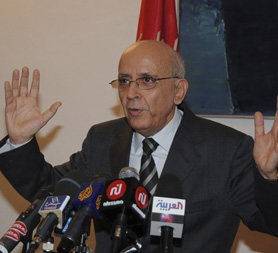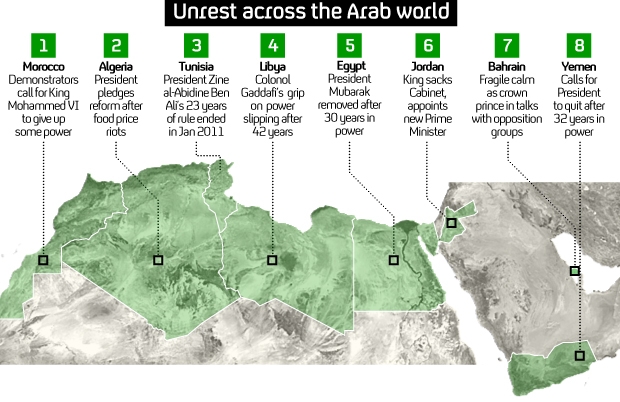Tunisia prime minister resigns amid new protests
 Alex Thomson
Chief Correspondent
Alex Thomson
Chief Correspondent
Tunisia’s revolution sparked the unrest across the Middle East. Now, as the country’s prime minister resigns, Alex Thomson reports on new protests in Tunis where one man said “we don’t have liberty”.
Tunisia‘s Prime Minister Mohamed Ghannouchi has resigned in an attempt to smooth the way for summer elections, as fresh protests hit the streets. On Sunday security forces fired into the air in the capital Tunis to disperse hundreds of youths who were throwing rocks and smashing shop windows.
One man told Channel 4 News: “We do not have liberty!”
Tunisia’s January uprising had been held up as a “model revolution” but many in the country believe too many of the ministers who served ousted president Zine al-Abidine Ben Ali remain in power.

Critics have accused Ghannouchi of being one of those too close to Ben Ali, who stood down on 14 Jan after a series of protests that triggered the popular uprisings across the Arab world.
Arab uprisings: what happens next in Egypt, Tunisia, Libya?
As he quit Mr Ghannouchi said: “My resignation will provide a better atmosphere for the new era.”
I am not a man of repression. Mohamed Ghannouchi
Three people have been killed since Friday in clashes between security forces and demonstrators at protests against him.
“My resignation is in the service of the country,” he said during the speech on state TV. “I am not a man of repression.”

Ghannouchi restated the government’s pledge to hold elections by July.
Analysts said Ghannouchi’s resignation had the potential to ease street tensions, but may also backfire.
“The hope is that, with this concession, street protests will calm down and this will allow the government to get to the task of preparing elections,” said Kamran Bokhari, regional director of the Middle East and South Asia for political risk consultancy Stratfor.
“But the risk is that it will embolden the opposition forces to demand more concessions.”